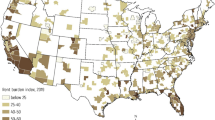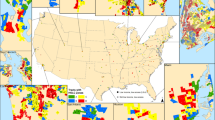Abstract
We consider land rental problems where there are several communities that can act as lessors and a single tenant who does not necessary need all the available land. A rule should determine which communities become lessors, how much land they rent and at which price. We present a complete characterization of the family of rules that satisfy reassignment-proofness by merging and spliting, apart from land monotonicity. We also define two parametric subfamilies. The first one is characterized by adding a property of weighted standard for two-person. The second one is characterized by adding consistency and continuity.



Similar content being viewed by others
Notes
We use the terms c and E because of their resemblance to bankruptcy problems.
Since rc(N) is constant, this condition is equivalent to \(\mu (E)-rE\) be maximum.
This condition holds, for example, when \(\mu \) is increasing, strictly concave, and \(\mu (0) \le 0\).
In fact, RLM applied to problems with a single lessor would also suffice.
For example, \(x_i = \frac{c_iE}{c(N)}\) for all \(i\in N\) when \(r \le \frac{K}{2E}\), and \(x_i = \min \{c_i, \lambda \}\) for all \(i\in N\), where \(\lambda \) solves \(\sum _{i\in N}\min \{c_i, \lambda \} = E\), when \(r > \frac{K}{2E}\).
We thank an anonymous referee for suggesting this alternative application.
References
Akiwumi FA (2014) Strangers and Sierra Leone mining: cultural heritage and sustainable development challenges. J Clean Product 84:773–782
Albizuri MJ, Zarzuelo JM (2007) The dual serial cost-sharing rule. Math Soc Sci 53(2):150–163
Arellano-Yanguas J (2011) Aggravating the resource curse: decentralisation, mining and conflict in Peru. J Dev Stud 47(4):617–638
Azima A, Sivapalan S, Zaimah R, Suhana S, Yusof H (2015) Boundry and customary land ownership dispute in Sarawak. Mediter J Soc Sci 6(4):17
Chun Y (1988) The proportional solution for rights problems. Math Soc Sci 15(3):231–246
de Frutos MA (1999) Coalitional manipulations in a bankruptcy problem. Rev Econ Des 4(3):255–272
Erlanson A, Flores-Szwagrzak K (2015) Strategy-proof assignment of multiple resources. J Econ Theory 159(Part A):137–162
Fraser J (2018) Mining companies and communities: collaborative approaches to reduce social risk and advance sustainable development. Resour Policy. https://doi.org/10.1016/j.resourpol.2018.02.003
Gildenhuys JA (2005) Indigenous peoples’ rights to minerals and the mining industry: current developments in South Africa from a national and international perspective. J Energy Nat Resour Law 23(4):465–481
Gómez-Rúa M, Vidal-Puga J (2011) Merge-proofness in minimum cost spanning tree problems. Int J Game Theory 40(2):309–329
Hart S, Mas-Colell A (1989) Potential, value, and consistency. Econometrica 57(3):589–614
Helwege A (2015) Challenges with resolving mining conflicts in Latin America. Extract Ind Soc 2(1):73–84
Huettner F (2015) A proportional value for cooperative games with a coalition structure. Theory Decis 78(2):273–287
Jaramillo P, Kayl Ç, Klijn F (2014) Asymmetrically fair rules for an indivisible good problem with a budget constraint. Soc Choice Welf 43(3):603–633
Ju B-G (2003) Manipulation via merging and splitting in claims problems. Rev Econ Des 8(2):205–215
Ju B-G (2013) Coalitional manipulation on networks. J Econ Theory 148(2):627–662
Ju B-G, Miyagawa E, Sakai T (2007) Non-manipulable division rules in claim problems and generalizations. J Econ Theory 132(1):1–26
Ju B-G, Moreno-Ternero J (2011) Progressive and merging-proof taxation. Int J Game Theory 40(1):43–62
Kaye JL, Yahya M (2012) Land and conflict: tool and guidance for preventing and managing land and natural resources conflict. UN Interagency Framework Team for Preventive Action, Guidance Note, New York
Kojima F, Manea M (2010) Incentives in the probabilistic serial mechanism. J Econ Theory 145(1):106–123
Kominers SD, Weyl EG (2012) Holdout in the assembly of complements: a problem for market design. Am Econ Rev Pap Proc 102(3):360–65
Koster M (2012) Consistent cost sharing. Math Methods Oper Res 75(1):1–28
Massó J, Nicolò A, Sen A, Sharma T, Ülkü L (2015) On cost sharing in the provision of a binary and excludable public good. J Econ Theory 155:30–49
Moreno-Ternero JD (2006) Proportionality and non-manipulability in bankruptcy problems. Int Game Theory Rev 8(1):127–139
Moreno-Ternero JD (2007) Bankruptcy rules and coalitional manipulation. Int Game Theory Rev 9(2):411–424
Morimoto S, Serizawa S (2015) Strategy-proofness and efficiency with non-quasi-linear preferences: a characterization of minimum price Walrasian rule. Theor Econ 10(2):445–487
Moulin H (1987) Equal or proportional division of a surplus, and other methods. Int J Game Theory 16(3):161–186
Moulin H (2002) Axiomatic cost and surplus sharing. In: Arrow KJ, Sen A, Suzumura K (eds) Handbook of social choice and welfare, vol I, 6th edn. Elsevier, Amsterdam, pp 289–357
Moulin H (2007) On scheduling fees to prevent merging, splitting, and transferring of jobs. Math Oper Res 32(2):266–283
Moulin H (2008) Proportional scheduling, split-proofness, and merge-proofness. Games Econ Behav 63:567–587
Moulin H, Shenker S (2001) Strategyproof sharing of submodular costs: budget balance versus efficiency. Econ Theory 18(3):511–533
Nguyen N, Boruff B, Tonts M (2018) Fool’s gold: understanding social, economic and environmental impacts from gold mining in Quang Nam Province, Vietnam. Sustainability 10(5):1355
O’Neill B (1982) A problem of rights arbitration from the Talmud. Math Soc Sci 2(4):345–371
Sarkar S (2015) Mechanism design for land acquisition. PhD thesis, TERI University
Sarkar S (2017) Mechanism design for land acquisition. Int J Game Theory 46(3):783–812
Sen A (2007) The theory of mechanism design: an overview. Econ Polit Weekly 42(49):8–13
Sosa I (2011) License to operate: indigenous relations and free prior and informed consent in the mining industry. Sustainalytics, Amsterdam
Sprumont Y (2005) On the discrete version of the Aumann–Shapley cost-sharing method. Econometrica 73(5):1693–1712
Sun N, Yang Z (2003) A general strategy proof fair allocation mechanism. Econ Lett 81(1):73–79
Svensson L-G (2009) Coalitional strategy-proofness and fairness. Econ Theory 40(2):227–245
Tetreault D (2015) Social environmental mining conflicts in Mexico. Latin Am Perspect 42(5):48–66
Thompson RL (2002) Agricultural price supports. http://www.econlib.org/library/Enc1/AgriculturalPriceSupports.html. Accessed 14 Jan 2019
Thomson W (2003) Axiomatic and game-theoretic analysis of bankruptcy and taxation problems: a survey. Math Soc Sci 45(3):249–297
Thomson W (2008) Two families of rules for the adjudication of conflicting claims. Soc Choice Welf 31(4):667–692
Thomson W (2015a) Axiomatic and game-theoretic analysis of bankruptcy and taxation problems: an update. Math Soc Sci 74:41–59
Thomson W (2015b) For claims problems, compromising between the proportional and constrained equal awards rules. Econ Theory 60(3):495–520
United Nations (2007) UN general assembly. United Nations declaration on the rights of indigenous peoples: resolution adopted by the General Assembly on 2 October 2007, A/RES/61/295
van den Brink R, Funaki Y, Ju Y (2013) Reconciling marginalism with egalitarianism: consistency, monotonicity, and implementation of egalitarian Shapley values. Soc Choice Welf 40(3):693–714
van der Ploeg F, Rohner D (2012) War and natural resource exploitation. Eur Econ Rev 56(8):1714–1729
Walter M, Urkidi L (2017) Community mining consultations in Latin America (2002–2012): the contested emergence of a hybrid institution for participation. Geoforum 84:265–279
Welker MA (2009) Corporate security begins in the community: mining, the corporate social responsibility industry, and environmental advocacy in Indonesia. Cult Anthropol 24(1):142–179
Author information
Authors and Affiliations
Corresponding author
Additional information
Publisher's Note
Springer Nature remains neutral with regard to jurisdictional claims in published maps and institutional affiliations.
Alfredo Valencia-Toledo thanks the Ministry of Education of Peru for its financial support through the “Beca Presidente de la República” grant of the “Programa Nacional de Becas y Crédito Educativo (PRONABEC)”. Juan Vidal-Puga acknowledges financial support from the Spanish Ministerio de Economía y Competitividad through Grant ECO2014-52616-R., Ministerio de Economía, Industria y Competitividad through Grant ECO2017-82241-R, and Xunta de Galicia (GRC 2015/014).
Rights and permissions
About this article
Cite this article
Valencia-Toledo, A., Vidal-Puga, J. Reassignment-proof rules for land rental problems. Int J Game Theory 49, 173–193 (2020). https://doi.org/10.1007/s00182-019-00684-2
Accepted:
Published:
Issue Date:
DOI: https://doi.org/10.1007/s00182-019-00684-2




